Dear WesleyNexus Colleagues,
One of the features of the Wesleyan tradition is the affirmation of personal experience as a foundation for Christian faith. The Wesleyan Quadrilateral includes experience along with scripture, tradition and reason as one of the spiritual sources within the tradition. As Wendel Thompson, a member of the WesleyNexus BOD highlighted in a recent meeting, we are all invited to “speak from our own experience.” With the Covid epidemic still raging, our patterns of expression and experience have been disrupted and many have needed to modify normal faith practice. I have as well. Since April of 2020, I have begun walking a labyrinth that exists in the courtyard of my local church. A labyrinth is a pathway from a single entry point that winds in and out, up and down, around a central hub that symbolizes the unity and totality of the universe and its creator.
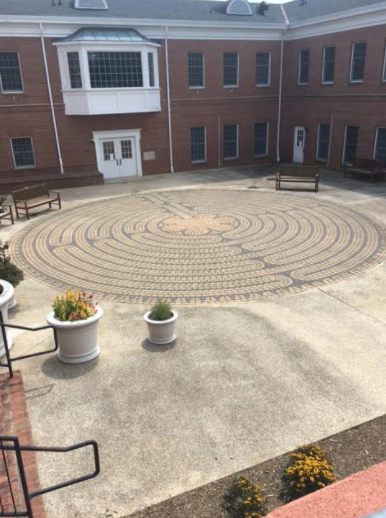
Since the church building was closed, walking the labyrinth was the only way to be physically present in the church. It is a time of prayer, contemplation and freedom. There are no instructions on how one is to walk the labyrinth. Since walking requires one to pay attention to the path, reading scripture or following a liturgical formula is difficult. So one is left alone, to walk slowly, giving prayers of concern for those who are suffering, gratitude for the gift of life, love and faith and reflecting on what one is called to be and do. Since we live in an evolutionary universe, in a cosmos of immense breadth and temporal extension, big thoughts come to mind. There is a palpable sense of what the theologian Friedrich Schleiermacher called the feeling of absolute dependence and Rudolf Otto called mysterium tremendum. This feeling is particularly sublime once the center is reached, which usually takes about 15 minutes. It is a feeling of being both alone and mindful of the moment. There is also a sense of unity with God’s creation, of being a participant in the multidimensional world, filled with complexity and emerging qualities from the smallest subatomic particle to the most complex structure we know, the human brain and the mind that coexists with the jello-like organ.

Mysterium tremendum indeed!
Since there is only one way in and one way out of a labyrinth, the exit route follows the same path, though I have found the exit is more like an exhaling and being in the moment, with fewer prayers and less reflection. It is less intense with a feeling of gratitude being dominant.
I have shared the experience of walking the labyrinth because too often the science and religion dialogue is too academic, too impersonal and too generalized. By sharing our experiences, we can both affirm what we know through science, know through faith and also make this knowledge meaningful. As we continue to struggle with the changes brought on by covid, I hope that you will find new means of personal expression and experience.
Thanks go out to our generous contributors. We encourage you to share comments, articles and insights that will help us all weather these difficult times.
Rick, Jennifer, Maynard, and the rest of the WesleyNexus team
******************************************************************
N.T. Wright & Francis Collins | A Christian Response to Coronavirus
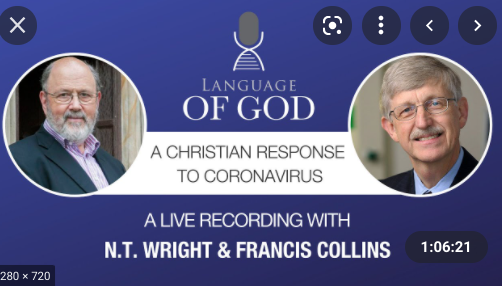
Welcome to Language of God. I’m your host, Jim Stump. We’re still talking coronavirus. Some people had predicted this would all be a distant memory by now. I think it’s safe to say that none of them were actual scientists, working with the data and understanding the gravity of the situation. There are exceptions of course, but scientists are generally pretty cautious and not given to sensationalism. All the more reason to take their advice seriously. And we’ve been thrilled to be able to go straight to the top of the biomedical research community and talk several times already with Francis Collins, the director of the National Institutes of Health. Before he had that job, he did a little thing which surely ranks among the greatest scientific achievements in the history of our species: he led the human genome project, which unraveled and mapped out our DNA. In between these posts, he wrote the best-selling book, The Language of God, after which this podcast is named, and he founded BioLogos. And most recently, he has been named this year’s Templeton Prize winner, succeeding people like Mother Teresa, Desmond Tutu, and Billy Graham. In conversation with him today is another long-time friend of BioLogos—biblical scholar Tom Wright. The section of N.T. Wright books on my bookshelf is among the longest by any single author. He writes careful and penetrating scholarly work—for instance I’ve written on the BioLogos website about slogging through his 800 page tome for Lent a few years ago, The Resurrection of the Son of God. But he also engages a more general readership and has deeply influenced and corrected the way many of us understand the Gospel story, through books like Simply Christian and Surprised by Hope. And there are at least 80 other books he’s authored. So it’s no surprise that he was among the first to have a book published reflecting theologically on the Coronavirus, called God and the Pandemic.
******************************************************************
Delivered by Richard Ballew, PhD at Trinity United Methodist Church, Germantown, Maryland
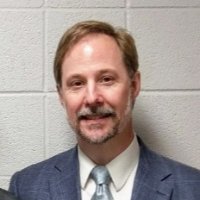
Ephesians 3:14-21 (NRSV)
14 For this reason I bow my knees before the Father, 15 from whom every family in heaven and on earth takes its name. 16 I pray that, according to the riches of his glory, he may grant that you may be strengthened in your inner being with power through his Spirit, 17 and that Christ may dwell in your hearts through faith, as you are being rooted and grounded in love. 18 I pray that you may have the power to comprehend, with all the saints, what is the breadth and length and height and depth, 19 and to know the love of Christ that surpasses knowledge, so that you may be filled with all the fullness of God. 20 Now to him who by the power at work within us is able to accomplish abundantly far more than all we can ask or imagine, 21 to him be glory in the church and in Christ Jesus to all generations, forever and ever. Amen.
The author of Ephesians shares a message of good news for all people. We recognize that all are made in the image of God, formed by God’s own hand, connected with all of creation, and breathed into with the breath of life. And, such was the love of God for humankind that God sent his only son so that the darkness may be filled with light and that we might know God through Christ. Let us look upon each day as a new beginning, filled with God’s grace, and always an opening to grow deeper in faith and love.
Richard (Ricky) Ballew graduated from the University of Virginia with a Bachelor of Science degree in chemistry and the University of Illinois at Urbana-Champaign with a Ph.D. in chemistry (physical). He has worked in the biotechnology and pharmaceutical industries at companies including CuraGen, Celera Genomics, Covance, MedImmune, and AstraZeneca, where he has held positions in technology development, laboratory automation, and information technology, as an individual contributor and in management. He is a member of Trinity United Methodist Church in Germantown, Maryland, where he serves as chair of the Discipleship Council. He is a Certified Lay Servant in the Central Maryland District of the Baltimore-Washington Annual Conference of The United Methodist Church. His wife Helen is appointed and serving as a Deacon at Grace United Methodist Church in Gaithersburg, Maryland. Richard is a member of the WesleyNexus Board of Directors.
You can read his talk here:
https://wesnex.org/wp-content/uploads/2021/08/WesleyNexus_Ephesians_3_14-21_Ballew.docx.pdf
******************************************************************
Reverend Dawn Stewart join WesleyNexus Board of Directors
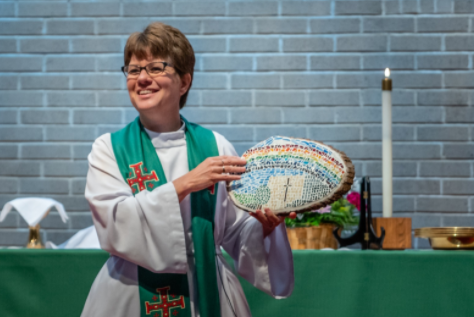
We are happy to announce that Reverent Dawn Stewart has joined the WesleyNexus Board of Directors. Dawn is pastor of Covenant United Methodist Church in Gaithersburg, Maryland. She has been in pastoral ministry since 2015 in the Baltimore-Washington Annual Conference. She has a Ph. D. in Mathematics from Virginia Polytechnic and State University and has taught mathematics in both high school and at the Air Force Academy.
******************************************************************
Patheos blog by Connor Wood
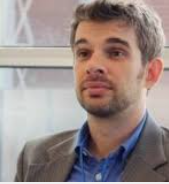
Connor Wood studied creative writing at the University of Wisconsin – Madison before traveling for a few years and working as an editor in Minneapolis. This was followed by study in science and religion earning a PhD from Boston University. He currently is doing research on the evolutionary origins and functions of ritual, as well as cognitive styles, left-right ideology, and the religion-science dialog. The articles here come from his Patheos.com blog on the scientific study of religion.
The Joys and Challenges of Interdisciplinary Research by Connor Wood
Music and Dance in Human Evolution by Connor Wood
***************************************************************
Muslims have the highest life satisfaction: They have a feeling of ‘oneness’ that trumps Christians, Buddhists and yogis, study suggests
By NATALIE RAHHAL DEPUTY HEALTH EDITOR FOR DAILYMAIL.COM
Muslims have the highest life satisfaction: They have a feeling of ‘oneness’ that trumps Christians, Buddhists and yogis, study suggests
- Previous research suggests ‘very religious’ and spiritual people fell more satisfied with their lives
- A feeling of ‘oneness’ is thought to be the common thread between different religions and is also linked to better overall happiness
- Muslim people believe more strongly in ‘oneness’ than those of any other religion – and are more satisfied with their lives for it, a new German study found
***************************************************************
Spiritual Technology: A Conversation With Kate J. Stockly
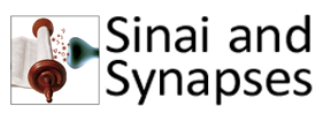
As Rabbi Josh Stanton observes, artificial intelligence – and the idea of “technology” in general – isn’t as new as we think. Religion, as a set of strategies that solve specific problems, could even be viewed as a form of technology. Kate J. Stockly’s new book co-written with Dr. Wesley Wildman, Spirit Tech: The Brave New World of Consciousness Hacking and Enlightenment Engineering, draws upon the newest research to illustrate how religion and ritual bind us together, and what new notions like “consciousness hacking” are really doing with ancient ideas – are they trying to turn something collective individual, or is it something more complex?
Spiritual Technology: A Conversation With Kate J. Stockly
***************************************************************
God’s Power in Open and Relational Theology by Tom Oord
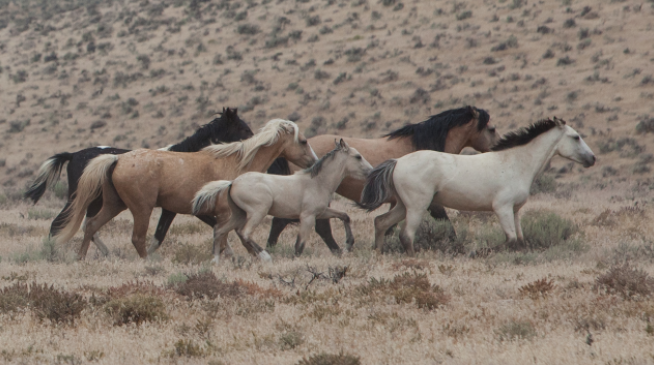
Open and relational theology says we best understand God’s power in ways consistent with our experiences and the world. It draws from scriptural stories and passages that speak of God acting without controlling others.
God’s Power in Open and Relational Theology
***************************************************************
IRAS Monthly Webinar Series

Life as Advent: Rethinking God, Rethinking the Human with Dr. C. J. Love
Aug 18, 2021 04:00 PM in Central Time (US and Canada)
In classic Christian theology, concepts of God and time are tightly interwoven (e.g. time, eternity, the Incarnation, liturgy, etc.), and this informs our unconscious assumptions about the presence and remoteness of the Incomprehensible in our day-to-day lives. This deeply embedded framework of thought ignores contemporary scientific insights pertaining to time, and how this gap influences our day-to-day experiences. It is within the fabric of science and temporality that this presentation will bring together concepts of time, event phenomenology and biology, to construct a more robust understanding of the human experience. The result will be a genetic-event model of time that avoids the classical Christian issues of temporal/eternal antinomy, mind/soul location, metaphysics of transcendence, and transcendental epistemology. This will provide us an original approach for thinking about God today in a culture that seeks both explanations from science and answers from religion. This presentation will discuss the usefulness of the genetic-event model in theology, in science, and in the dialogue between theology and science, demonstrating that this model can replace theological nostalgia while providing a solid foundation for a fruitful and faithful self-understanding within the science and theology dialogue.
5:00 PM ET
4:00 PM CT
2:00 PM PT
10:00 PM London, UK
About the August 18, 2021 presenter:
Dr. C. J. Love is currently co-editing a book that examines how philosophical, theological, and social scientific principles can be applied to our social institutions such as education, social welfare, criminal justice, government, and the economy. She has also published God, Genetics and Event Phenomenology: Rethinking Common Human Experience of Temporality in Theology, and Its Usefulness in Science, Theology, and Contemporary Culture. C.J. is actively involved in IRAS as the Vise President of Summer Conferences, webinar technician, and is co-chairing the 2022 IRAS summer conference “We” and “They”: Cross Cultural Conversations on Identity. Her interest in science and theology arose after “retiring” from a career in clinical human genetics to full-time parent her three children who are now in their twenties. C.J. developed an interest in theology after taking a moral theology class for fun. She earned her Ph.D. from Loyola University Chicago while raising her three children and defended her dissertation with distinction.ra of climate change.
The IRAS webinar is FREE but registration is required:
https://us02web.zoom.us/webinar/register/WN_PAU0zK2VRma4aINHWBf37g
***************************************************************
GEN Z’S RELIGIOUS AFFILIATION STATS ARE CONFUSING … BUT ONLY WHEN VIEWED FROM A CHRISTIAN-CENTRIC PERSPECTIVE by BROOK WILENSKY-LANFORD

So “belief” is inaccessible and exists in a complex relationship with practice; and our own religious “affiliation” or lack thereof doesn’t necessarily count for much in the world at large. Why then do we persist in trying to count American religion? My goal isn’t to get rid of these surveys, but to look at them differently. They are indeed “data,” but not in the way they purport to be. There may not be any solid, observable referent for the numbers of young people who say they “believe” in some kind of “higher power.” But that does not mean we shouldn’t ask. Any survey is a snapshot of a moment, in which the questions reveal as much as, if not more than, the answers.
The article can be found here: GEN Z’S RELIGIOUS AFFILIATION STATS ARE CONFUSING
***************************************************************
I Will No Longer Marvel at How Quickly Time Passes
I Can’t Believe It’s Almost August! by Allan R. Bevere

So, from this day on to the end of my life, I will no longer marvel at how quickly time passes. Instead, I will wonder in amazement that God has chosen to share these handful of decades of time with me giving me the gift of this time and of his presence– and called me according to his divine purpose.
In the fullness of time, God sent his Son (Galatians 4:4) so that we might experience God’s fullness in all the moments of our time.
***************************************************************
On Naming and Counting
BY LAURA KOLBE

In medical school we are taught that every doctor is innately either a “lumper” or a “splitter,” either someone who sees many things as one, or someone who sees one thing as many. In my clinical life as a doctor, I realize now that I am a lumper who aspires to be a splitter. Neither type is necessarily bad, but unhappy are those who desire to be other than they are. As Isaiah Berlin wrote of Leo Tolstoy—a fox who wished he were a hedgehog, which is a bit like being a splitter-doctor aspiring to lump—his “agonized belief in a single, serene vision” rendered him chronically restless and deprived.
